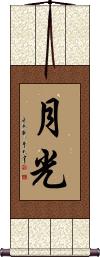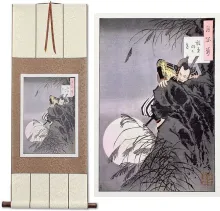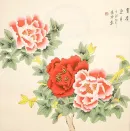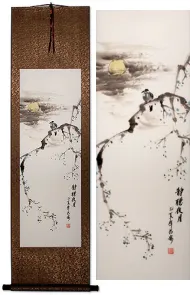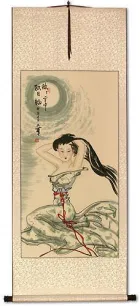Many custom options...
And formats...

Not what you want?
Try other similar-meaning words, fewer words, or just one word.
Feel free to email me with your request. If it's easy, I'll translate it for free and add it to this database of calligraphy for you.
Moon Light in Chinese / Japanese...
Buy a Moon Light calligraphy wall scroll here!
Moonlight
月光 is the Chinese, old Korean Hanja, and Japanese Kanji title for moonlight.
This can also be used to describe a moonbeam and can be a given name in all three languages (pronounced as Rumi when used as a female given name in Japanese).
This in-stock artwork might be what you are looking for, and ships right away...
Gallery Price: $126.00
Your Price: $69.88
Gallery Price: $108.00
Your Price: $59.88
Gallery Price: $90.00
Your Price: $49.88
Gallery Price: $200.00
Your Price: $88.88
Gallery Price: $232.00
Your Price: $128.88
Gallery Price: $126.00
Your Price: $69.88
Gallery Price: $126.00
Your Price: $69.88
Gallery Price: $126.00
Your Price: $69.88
Gallery Price: $220.00
Your Price: $138.88
Not the results for moon light that you were looking for?
Below are some entries from our dictionary that may match your moon light search...
| Characters If shown, 2nd row is Simp. Chinese |
Pronunciation Romanization |
Simple Dictionary Definition |
影 see styles |
yǐng ying3 ying kage かげ |
More info & calligraphy: Shadow(1) shadow; silhouette; figure; shape; (2) reflection; image; (3) ominous sign; (4) light (stars, moon); (5) trace; shadow (of one's former self); (surname) Kage Shadow, picture, image, reflection, hint; one of the twelve 'colours'. |
朣 see styles |
tóng tong2 t`ung tung |
light from the rising moon |
五翳 see styles |
wǔ yì wu3 yi4 wu i go ei |
The five films, or interceptors of the light of sun and moon— smoke, cloud dust, fog, and the hands of asuras. |
四禪 四禅 see styles |
sì chán si4 chan2 ssu ch`an ssu chan shizen |
(四禪天) The four dhyāna heavens, 四靜慮 (四靜慮天), i. e. the division of the eighteen brahmalokas into four dhyānas: the disciple attains to one of these heavens according to the dhyāna he observes: (1) 初禪天 The first region, 'as large as one whole universe' comprises the three heavens, Brahma-pāriṣadya, Brahma-purohita, and Mahābrahma, 梵輔, 梵衆, and 大梵天; the inhabitants are without gustatory or olfactory organs, not needing food, but possess the other four of the six organs. (2) 二禪天 The second region, equal to 'a small chiliocosmos' 小千界, comprises the three heavens, according to Eitel, 'Parīttābha, Apramāṇābha, and Ābhāsvara, ' i. e. 少光 minor light, 無量光 infinite light, and 極光淨 utmost light purity; the inhabitants have ceased to require the five physical organs, possessing only the organ of mind. (3) 三禪天 The third region, equal to 'a middling chiliocosmos '中千界, comprises three heavens; Eitel gives them as Parīttaśubha, Apramāṇaśubha, and Śubhakṛtsna, i. e. 少淨 minor purity, 無量淨 infinite purity, and 徧淨 universal purity; the inhabitants still have the organ of mind and are receptive of great joy. (4) 四禪天 The fourth region, equal to a great chiliocosmos, 大千界, comprises the remaining nine brahmalokas, namely, Puṇyaprasava, Anabhraka, Bṛhatphala, Asañjñisattva, Avṛha, Atapa, Sudṛśa, Sudarśana, and Akaniṣṭha (Eitel). The Chinese titles are 福生 felicitous birth, 無雲 cloudless, 廣果 large fruitage, 無煩 no vexations, atapa is 無熱 no heat, sudṛśa is 善見 beautiful to see, sudarśana is 善現 beautiful appearing, two others are 色究竟 the end of form, and 無想天 the heaven above thought, but it is difficult to trace avṛha and akaniṣṭha; the inhabitants of this fourth region still have mind. The number of the dhyāna heavens differs; the Sarvāstivādins say 16, the 經 or Sutra school 17, and the Sthavirāḥ school 18. Eitel points out that the first dhyāna has one world with one moon, one mem, four continents, and six devalokas; the second dhyāna has 1, 000 times the worlds of the first; the third has 1, 000 times the worlds of the second; the fourth dhyāna has 1, 000 times those of the third. Within a kalpa of destruction 壞劫 the first is destroyed fifty-six times by fire, the second seven by water, the third once by wind, the fourth 'corresponding to a state of absolute indifference' remains 'untouched' by all the other evolutions; when 'fate (天命) comes to an end then the fourth dhyāna may come to an end too, but not sooner'. |
堕つ see styles |
otsu おつ |
(v2t-k,vi) (1) (archaism) to fall down; to drop; to fall (e.g. rain); to sink (e.g. sun or moon); to fall onto (e.g. light or one's gaze); (2) (archaism) to be omitted; to be missing; (3) (archaism) to crash; to degenerate; to degrade; to fall behind; (4) (archaism) to be removed (e.g. illness, possessing spirit, name on a list); (5) (archaism) to fall (into someone's hands); to become someone's possession; (6) (archaism) to fall; to be defeated; to surrender |
墜つ see styles |
otsu おつ |
(v2t-k,vi) (1) (archaism) to fall down; to drop; to fall (e.g. rain); to sink (e.g. sun or moon); to fall onto (e.g. light or one's gaze); (2) (archaism) to be omitted; to be missing; (3) (archaism) to crash; to degenerate; to degrade; to fall behind; (4) (archaism) to be removed (e.g. illness, possessing spirit, name on a list); (5) (archaism) to fall (into someone's hands); to become someone's possession; (6) (archaism) to fall; to be defeated; to surrender |
大刧 大劫 see styles |
dà jié da4 jie2 ta chieh daikō |
mahākalpa. The great kalpa, from the beginning of a universe till it is destroyed and another begins in its place. It has four kalpas or periods known as vivarta 成刧 the creation period; vivarta‐siddha 住刧 the appearance of sun and moon, i.e. light, and the period of life, human and general; saṃvarta 壤刧 or 滅刧 destruction first by fire, then water, then fire, then deluge, then a great wind, i.e. water during seven small kalpas, fire during 56 and wind one, in all 64; saṃvartatthāhi 増滅刧 total destruction gradually reaching the void. A great kalpa is calculated as eighty small kalpas and to last 1,347,000,000 years. |
落つ see styles |
otsu おつ |
(v2t-k,vi) (1) (archaism) to fall down; to drop; to fall (e.g. rain); to sink (e.g. sun or moon); to fall onto (e.g. light or one's gaze); (2) (archaism) to be omitted; to be missing; (3) (archaism) to crash; to degenerate; to degrade; to fall behind; (4) (archaism) to be removed (e.g. illness, possessing spirit, name on a list); (5) (archaism) to fall (into someone's hands); to become someone's possession; (6) (archaism) to fall; to be defeated; to surrender |
落る see styles |
ochiru おちる |
(irregular okurigana usage) (v1,vi) (1) to fall down; to drop; to fall (e.g. rain); to sink (e.g. sun or moon); to fall onto (e.g. light or one's gaze); to be used in a certain place (e.g. money); (2) to be omitted; to be missing; (3) to decrease; to sink; (4) to fail (e.g. exam or class); to lose (contest, election, etc.); (5) to crash; to degenerate; to degrade; to fall behind; (6) to become indecent (of a conversation); (7) to be ruined; to go under; (8) to fade; to come out (e.g. a stain); to come off (e.g. makeup); to be removed (e.g. illness, possessing spirit, name on a list); (9) to fall (into someone's hands); to become someone's possession; (10) to fall (into a trap); to fall (for a trick); (11) to give in; to give up; to confess; to flee; (12) to fall; to be defeated; to surrender; (13) to come to (in the end); to end in; (14) to fall (in love, asleep, etc.); (15) to swoon (judo); (16) to consent; to understand; (17) (computer terminology) to crash; to freeze; (18) to die; (19) to move to the depths |
迦葉 迦叶 see styles |
jiā shě jia1 she3 chia she kashou / kasho かしょう |
(person) Kasyapa (Hindu sage); Kashou (迦葉波) kāśyapa, 迦攝 (迦攝波) inter alia 'a class of divine beings similar to or equal to prajāpati'; the father 'of gods, demons, men, fish, reptiles, and all animals'; also 'a constellation'. M.W. It is intp. as 'drinking light', i.e. swallowing sun and moon, but without apparent justification. (1) One of the seven or ten ancient Indian sages. (2) Name of a tribe or race. (3) Kāśyapa Buddha, the third of the five buddhas of the present kalpa, the sixth of the seven ancient buddhas. (4) Mahākāśyapa, a brahman of Magadha, who became one of the principal disciples of Śākyamuni, and after his death became leader of the disciples, 'convoked and directed the first synod, whence his title Ārya Sthavira (上坐, lit. chairman) is derived.' Eitel. He is accounted the chief of the ascetics before the enlightenment; the first compiler of the canon and the first patriarch. (5) There were five Kāśyapas, disciples of the Buddha, Mahā-Kāśyapa, Uruvilā-Kāśyapa, Gayā-Kāśyapa, Nadī-Kāśyapa, and Daśabala-Kāśyapa; the second, third, and fourth are said to have been brothers. (6) A bodhisattva, whose name heads a chapter in the Nirvana Sutra. (7) 迦葉摩騰 Kāśyapa-Mātaṅga, the monk who with Gobharana, or Dharmarakṣa, i.e. Zhu Falan 竺法蘭, according to Buddhist statements, brought images and scriptures to China with the commissioners sent by Mingdi, arriving in Luoyang A.D. 67. |
地球照 see styles |
chikyuushou / chikyusho ちきゅうしょう |
Earth light (illumination of the moon by light reflected from the Earth); earthshine |
墜ちる see styles |
ochiru おちる |
(v1,vi) (1) to fall down; to drop; to fall (e.g. rain); to sink (e.g. sun or moon); to fall onto (e.g. light or one's gaze); to be used in a certain place (e.g. money); (2) to be omitted; to be missing; (3) to decrease; to sink; (4) to fail (e.g. exam or class); to lose (contest, election, etc.); (5) to crash; to degenerate; to degrade; to fall behind; (6) to become indecent (of a conversation); (7) to be ruined; to go under; (8) to fade; to come out (e.g. a stain); to come off (e.g. makeup); to be removed (e.g. illness, possessing spirit, name on a list); (9) to fall (into someone's hands); to become someone's possession; (10) to fall (into a trap); to fall (for a trick); (11) to give in; to give up; to confess; to flee; (12) to fall; to be defeated; to surrender; (13) to come to (in the end); to end in; (14) to fall (in love, asleep, etc.); (15) to swoon (judo); (16) to consent; to understand; (17) (computer terminology) to crash; to freeze; (18) to die; (19) to move to the depths |
摩利支 see styles |
mó lì zhī mo2 li4 zhi1 mo li chih marishi まりし |
{Buddh} Marici (or 摩梨支, or 摩里支); 末利支 Marīci. Rays of light, the sun's rays, said to go before the sun; mirage; also intp. as a wreath. A goddess, independent and sovereign, protectress against all violence and peril. 'In Brahmanic mythology, the personification of light, offspring of Brahmā, parent of Sūrya.' 'Among Chinese Buddhists Maritchi is represented as a female with eight arms, two of which are holding aloft emblems of sun and moon, and worshipped as goddess of light and as the guardian of all nations, whom she protects from the fury of war. She is addressed as 天后 queen of heaven, or as 斗姥 lit. mother of the Southern measure (μλρστζ Sagittarī), and identified with Tchundi' and 'with Mahēśvarī, the wife of Maheśvara, and has therefore the attribute Mātrikā', mother of Buddhas. Eitel. Taoists address her as Queen of Heaven. |
日月暈 日月晕 see styles |
rì yuè yùn ri4 yue4 yun4 jih yüeh yün |
halo; ring of light around the sun or moon |
月宮殿 see styles |
gekkyuuden; gakkuuden; gakkuden / gekkyuden; gakkuden; gakkuden げっきゅうでん; がっくうでん; がっくでん |
(1) moon palace of the Hindu god Chandra; (2) imperial palace; (3) (archaism) Yoshiwara red light district |
落ちる see styles |
ochiru おちる |
(v1,vi) (1) to fall down; to drop; to fall (e.g. rain); to sink (e.g. sun or moon); to fall onto (e.g. light or one's gaze); to be used in a certain place (e.g. money); (2) to be omitted; to be missing; (3) to decrease; to sink; (4) to fail (e.g. exam or class); to lose (contest, election, etc.); (5) to crash; to degenerate; to degrade; to fall behind; (6) to become indecent (of a conversation); (7) to be ruined; to go under; (8) to fade; to come out (e.g. a stain); to come off (e.g. makeup); to be removed (e.g. illness, possessing spirit, name on a list); (9) to fall (into someone's hands); to become someone's possession; (10) to fall (into a trap); to fall (for a trick); (11) to give in; to give up; to confess; to flee; (12) to fall; to be defeated; to surrender; (13) to come to (in the end); to end in; (14) to fall (in love, asleep, etc.); (15) to swoon (judo); (16) to consent; to understand; (17) (computer terminology) to crash; to freeze; (18) to die; (19) to move to the depths |
阿彌陀 阿弥陀 see styles |
ā mí tuó a1 mi2 tuo2 a mi t`o a mi to Amida あみだ |
(out-dated kanji) (1) (Buddhist term) Amitabha (Buddha); Amida; (2) (kana only) (abbreviation) ghostleg lottery; ladder lottery; lottery in which participants trace a line across a lattice pattern to determine the winner; (3) (kana only) (abbreviation) wearing a hat pushed back on one's head (阿彌) amita, boundless, infinite; tr. by 無量 immeasurable. The Buddha of infinite qualities, known as 阿彌陀婆 (or 阿彌陀佛) Amitābha, tr. 無量光 boundless light; 阿彌陀廋斯Amitāyus, tr. 無量壽 boundless age, or life; and among the esoteric sects Amṛta 甘露 (甘露王) sweet-dew (king). An imaginary being unknown to ancient Buddhism, possibly of Persian or Iranian origin, who has eclipsed the historical Buddha in becoming the most popular divinity in the Mahāyāna pantheon. His name indicates an idealization rather than an historic personality, the idea of eternal light and life. The origin and date of the concept are unknown, but he has always been associated with the west, where in his Paradise, Suikhāvatī, the Western Pure Land, he receives to unbounded happiness all who call upon his name (cf. the Pure Lands 淨土 of Maitreya and Akṣobhya). This is consequent on his forty-eight vows, especially the eighteenth, in which he vows to refuse Buddhahood until he has saved all living beings to his Paradise, except those who had committed the five unpardonable sins, or were guilty of blasphemy against the Faith. While his Paradise is theoretically only a stage on the way to rebirth in the final joys of nirvana, it is popularly considered as the final resting-place of those who cry na-mo a-mi-to-fo, or blessed be, or adoration to, Amita Buddha. The 淨土 Pure-land (Jap. Jōdo) sect is especially devoted to this cult, which arises chiefly out of the Sukhāvatīvyūha, but Amita is referred to in many other texts and recognized, with differing interpretations and emphasis, by the other sects. Eitel attributes the first preaching of the dogma to 'a priest from Tokhara' in A. D.147, and says that Faxian and Xuanzang make no mention of the cult. But the Chinese pilgrim 慧日Huiri says he found it prevalent in India 702-719. The first translation of the Amitāyus Sutra, circa A.D. 223-253, had disappeared when the Kaiyuan catalogue was compiled A.D. 730. The eighteenth vow occurs in the tr. by Dharmarakṣa A.D. 308. With Amita is closely associated Avalokiteśvara, who is also considered as his incarnation, and appears crowned with, or bearing the image of Amita. In the trinity of Amita, Avalokiteśvara appears on his left and Mahāsthāmaprāpta on his right. Another group, of five, includes Kṣitigarbha and Nāgārjuna, the latter counted as the second patriarch of the Pure Land sect. One who calls on the name of Amitābha is styled 阿彌陀聖 a saint of Amitābha. Amitābha is one of the Five 'dhyāni buddhas' 五佛, q.v. He has many titles, amongst which are the following twelve relating to him as Buddha of light, also his title of eternal life: 無量光佛Buddha of boundless light; 無邊光佛 Buddha of unlimited light; 無礙光佛 Buddha of irresistible light; 無對光佛 Buddha of incomparable light; 燄王光佛 Buddha of yama or flame-king light; 淸淨光佛 Buddha of pure light; 歡喜光佛 Buddha of joyous light; 智慧光佛 Buddha of wisdom light; 不斷光佛 Buddha of unending light; 難思光佛 Buddha of inconceivable light; 無稱光佛Buddha of indescribable light; 超日月光佛 Buddha of light surpassing that of sun and moon; 無量壽 Buddha of boundless age. As buddha he has, of course, all the attributes of a buddha, including the trikāya, or 法報化身, about which in re Amita there are differences of opinion in the various schools. His esoteric germ-letter is hrīḥ, and he has specific manual-signs. Cf. 阿彌陀經, of which with commentaries there are numerous editions. |
一月三身 see styles |
yī yuè sān shēn yi1 yue4 san1 shen1 i yüeh san shen ichigatsu sanshin |
The allegorical trikāya or three bodies of the moon, i.e. form as 法身, its light as 報身, its reflection as 應身; the Buddha-truth 法 has also its 體 body, its light of wisdom 智, and its application or use 用, but all three are one, or a trinity; see trikāya, 三身. |
三種光明 三种光明 see styles |
sān zhǒng guāng míng san1 zhong3 guang1 ming2 san chung kuang ming sanshu kōmyō |
The three kinds of light: (a) extemal— sun, moon, stars, lamps, etc.; (b) dharma, or the light of right teaching and conduct; (c) the effulgence or bodily halo emitted by Buddhas, bodhisattvas, devas. |
光風霽月 光风霁月 see styles |
guāng fēng jì yuè guang1 feng1 ji4 yue4 kuang feng chi yüeh koufuuseigetsu / kofusegetsu こうふうせいげつ |
lit. light breeze and clear moon (idiom); period of peace and prosperity; noble and benevolent character (noun - becomes adjective with の) (yoji) serenity |
十二光佛 see styles |
shí èr guāng fó shi2 er4 guang1 fo2 shih erh kuang fo jūni kōbutsu |
Amitābha's twelve titles of light. The無量壽經上 gives them as 無量光佛, etc., i.e. the Buddha of light that is immeasurable boundless, irresistible, incomparable, yama (or flaming), pure, joy, wisdom, unceasing, surpassing thought, ineffable, surpassing sun and moon. Another list is given in the 九品往生阿彌陀...經. |
白黑布薩 白黑布萨 see styles |
bái hēi bù sà bai2 hei1 bu4 sa4 pai hei pu sa byakukoku fusatsu |
light and dark uposatha, the observances of the waxing and waning moon, cf. 白月. |
蔽日月光 see styles |
bì rì yuè guāng bi4 ri4 yue4 guang1 pi jih yüeh kuang Hei nichigetsu kō |
Covering the Light of the Sun and Moon |
Variations: |
kage かげ |
(1) shadow; silhouette; figure; shape; (2) reflection; image; (3) ominous sign; (4) light (stars, moon); (5) trace; shadow (of one's former self); (6) (non-standard; usu. written as 陰) (See 陰・かげ・2) behind; background; other side |
Variations: |
ochiru おちる |
(v1,vi) (1) to fall; to drop; to come down; to crash; to collapse; to cave in; to give way; (v1,vi) (2) to set (of the sun or moon); to sink; to dip; to go down; (v1,vi) (3) to decrease (of popularity, quality, speed, sales, etc.); to fall; to drop; to go down; to decline; to deteriorate; to abate (of wind); (v1,vi) (4) to be inferior (to); to be not as good (as); to fall short (of); (v1,vi) (5) to come off (of dirt, paint, makeup, etc.); to come out (of a stain); to fade (of colour); to be removed (of an illness, possessing spirit, etc.); (v1,vi) (6) to disappear (of excess fat); to become thinner; to become leaner; (v1,vi) (7) to be left out; to be omitted; to be missing; (v1,vi) (8) to fail (an exam); to lose (a contest, election, etc.); to be unsuccessful; (v1,vi) (9) (also written as 堕ちる) to decline (of morals, character, etc.); to become vulgar (e.g. of a conversation); to stoop (to); to sink (so low); (v1,vi) (10) (also written as 堕ちる) to be ruined; to go under; to fall (into hell); (v1,vi) (11) (See 恋に落ちる,眠りに落ちる) to fall (in love, asleep, etc.); (v1,vi) (12) to fall (into someone's hands); to be accepted (of a bid); to be won (of a tender); to be honoured (of a bill); (v1,vi) (13) to fall into (a trap); to fall for (a trick); (v1,vi) (14) to give in; (v1,vi) (15) to confess; to own up; (v1,vi) (16) to come to (a conclusion, topic, etc.); to arrive at (in the end); (v1,vi) (17) to leave (a city, castle, etc.); to (be defeated and) flee; (v1,vi) (18) (See 腑に落ちない,胸に落ちる) to sink in; to be accepted (in one's heart); (v1,vi) (19) to fall (to the enemy); to be defeated; (v1,vi) (20) to come in (of money); (v1,vi) (21) to fall (upon; of light, a shadow, one's gaze, etc.); (v1,vi) (22) to pass out (in judo); to fall unconscious; (v1,vi) (23) {comp} to go down (of a website, server, etc.); to crash; (v1,vi) (24) (slang) to log out (of an online game, chat room, etc.); to drop out; to leave; to go offline; (v1,vi) (25) to move to deeper water (of a fish in cold weather); (v1,vi) (26) to die (of an animal) |
Variations: |
ochiru おちる |
(v1,vi) (1) (occ. 堕ちる for depravity and 墜ちる for a crash) to fall down; to drop; to fall (e.g. rain); to sink (e.g. sun or moon); to fall onto (e.g. light or one's gaze); to be used in a certain place (e.g. money); (v1,vi) (2) to be omitted; to be missing; (v1,vi) (3) to decrease; to sink; (v1,vi) (4) to fail (e.g. exam or class); to lose (contest, election, etc.); (v1,vi) (5) to crash; to degenerate; to degrade; to fall behind; (v1,vi) (6) to become indecent (of a conversation); (v1,vi) (7) to be ruined; to go under; (v1,vi) (8) to fade; to come out (e.g. a stain); to come off (e.g. makeup); to be removed (e.g. illness, possessing spirit, name on a list); (v1,vi) (9) to fall (into someone's hands); to become someone's possession; (v1,vi) (10) to fall (into a trap); to fall (for a trick); (v1,vi) (11) to give in; to give up; to confess; to flee; (v1,vi) (12) to fall; to be defeated; to surrender; (v1,vi) (13) to come to (in the end); to end in; (v1,vi) (14) (See 恋に落ちる・こいにおちる,眠りに落ちる・ねむりにおちる) to fall (in love, asleep, etc.); (v1,vi) (15) to swoon (judo); (v1,vi) (16) (See 腑に落ちない・ふにおちない) to consent; to understand; (v1,vi) (17) {comp} to go down (of a website, server, etc.); to crash; (v1,vi) (18) (slang) to log out (of an online game, chat room, etc.); to drop out; to leave; to go offline; (v1,vi) (19) (of animals) to die; (v1,vi) (20) (of fish when it gets cold) to move to the depths |
The following table may be helpful for those studying Chinese or Japanese...
| Title | Characters | Romaji (Romanized Japanese) | Various forms of Romanized Chinese | |
| Moonlight | 月光 | gekkou / geko | yuè guāng yue4 guang1 yue guang yueguang | yüeh kuang yüehkuang |
Successful Chinese Character and Japanese Kanji calligraphy searches within the last few hours...
